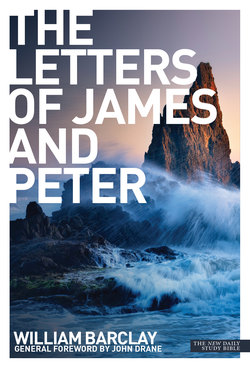Читать книгу New Daily Study Bible: The Letters to James and Peter - William Barclay - Страница 18
На сайте Литреса книга снята с продажи.
ОглавлениеGOD’S GIVING AND OUR ASKING
James 1:5–8
If any of you is deficient in wisdom, let him ask it from God, who gives generously to all men and never casts up the gift, and it will be given to him. Let him ask in faith, with no doubts in his mind; for he who oscillates between doubts is like a surge of the sea, wind-driven and blown hither and thither. Let not that man think that he will receive anything from the Lord, a man with a divided mind, inconstant in all his ways.
THERE is a close connection between this passage and what has gone before. James has just told his readers that, if they use all the testing experiences of life in the right way, they will emerge from them with that unswerving constancy which is the basis of all the virtues. But immediately the question arises: ‘Where can I find the wisdom and the understanding to use these testing experiences in the right way?’ James’ answer is: ‘If you feel that you do not have the wisdom to use aright the experiences of this life – and no one truly possesses that wisdom – request it from God.’
One thing stands out. For James, the Christian teacher with the Jewish background, wisdom is entirely practical. It is not philosophic speculation and intellectual knowledge; it is concerned with the business of living. The Stoics defined wisdom as ‘knowledge of things human and divine’. But, in his commentary, J. H. Ropes defines this Christian wisdom as ‘the supreme and divine quality of the soul whereby man knows and practises righteousness’. F. J. A. Hort defines it as ‘that endowment of heart and mind which is needed for the right conduct of life’. In the Christian wisdom there is, of course, knowledge of the deep things of God, but it is essentially practical; it is such knowledge turned into action in the decisions and personal relationships of everyday life. When we ask God for that wisdom, we must remember two things.
(1) We must remember how God gives. He gives generously and never calculates the gift. ‘All wisdom’, said Jesus the son of Sirach, ‘is from the Lord, and is with him forever’ (Sirach [Ecclesiasticus] 1:1). But the Jewish wise men were well aware how the best gift in the world could be spoiled by the manner of the giving. They have much to say about how the fool gives. ‘My child, do not mix reproach with your good deeds, or spoil your gift with harsh words . . . Indeed, does not a word surpass a good gift? Both are to be found in a gracious person. A fool is ungracious and abusive, and a gift of a grudging giver makes the eyes dim’ (Sirach 18:15–18). ‘A fool’s gift will profit you nothing, for he looks for recompense sevenfold. He gives little, and upbraids much; he opens his mouth like a town crier. Today he lends, and tomorrow he asks it back; such a one is hateful to God and humans’ (Sirach 20:14–15). The same writer warns against ‘abusive words before friends’ (Sirach 41:122). There is a kind of giver who gives only with a view to getting more than is given; such people give only to gratify their vanity and their sense of power by putting recipients under an obligation which they will never be allowed to forget; they give and then continuously calculate the value of the gift that they have given. But God gives with generosity. Philemon, the Greek poet, called God ‘the lover of gifts’, not in the sense of loving to receive gifts, but in the sense of loving to give them. Nor does God calculate the value of his gifts; he gives with all the splendour of his love, because it is his nature to give.
(2) We must remember how the asker must ask. We must ask without doubts. We must be sure of both the power and the desire of God to give. If we ask in doubt, our minds are like the broken water of the sea, driven hither and thither by any chance wind. J. B. Mayor describes the one who doubts as being like a cork carried by the waves, now near the shore, now far away. Such a person is unstable. Hort suggests that the picture is of someone who is drunk, staggering from side to side on the road and getting nowhere. James says vividly that such a person is dipsuchos, which literally means someone with two souls, or two minds. One believes, the other disbelieves, and the individual is a walking civil war in which trust and distrust of God wage a continual battle against each other.
If we are to use aright the experiences of life to develop a sterling character, we must ask for wisdom from God. And when we ask, we must remember the absolute generosity of God and see to it that we ask believing that we shall receive what God knows it is good and right for us to have.
